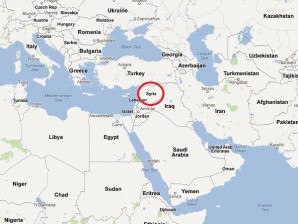
The Syrian Observatory for Human Rights, a Britain-based monitoring group, said it had documented the deaths of at least 202,354 people in less than four years of conflict.
Most of those killed were combatants in a conflict that began with peaceful anti-government protests in March 2011 and later spiraled into a civil war.
Observatory director Rami Abdel Rahman said 63,074 civilians were among the dead, including more than 10,000 children.
The conflict has also displaced around half of Syria’s population, with more than three million people fleeing to neighboring countries and beyond.
Many of the refugees are struggling to survive on foreign aid and their plight was expected to get worse after the UN’s World Food Program said it was halting food aid in the region because of funding shortfalls.
“It’s going to be a devastating impact. This couldn’t come at a worse time,” said Ron Redmond, regional spokesman for the UN refugee agency UNHCR.
“We’re doing everything we can… to keep their shelters at least warm and as dry as possible. But you can be warm and dry, but if you don’t have food, you’re in big trouble.”
The WFP said it needed $64 million (51 million euros) to fund its food voucher program for December alone, and that “many donor commitments remain unfulfilled”.
‘A nightmare for refugees’
The program helps nearly two million refugees in the Middle East, with each receiving a card topped up with money every month allowing them to buy food equivalent to 2,100 calories per day.
Worst-hit in the region is Lebanon, where more than 800,000 of the 1.1 million Syrian refugees in the country were receiving WFP food voucher support.
In Jordan, some 450,000 refugees will get no money this month, though around 90,000 living in the UN’s Zaatari and Azraq camps will continue to receive assistance.
In Turkey and Egypt, there are sufficient funds to provide aid until December 13 but not beyond, said WFP’s Regional Emergency Coordinator Muhannad Hadi.
“It’s going to be a nightmare for refugees,” Hadi told AFP.
“Those people are depending on the WFP to feed them, most of them are totally dependent on us. They have no income.”
Many refugees struggle to make ends meet even with international aid, and in Lebanon and elsewhere they often live in squalid informal camps, exposed to the heat of summer and cold of winter.
Across the region, they also face increasing tension with host communities angry about the strain that the refugee influx has put on sparse local resources.
“We are suffering more-and-more, day-by-day. The world is ignoring our misery,” Abu Yaman, a Syrian refugee living in Ramtha in north Jordan, told AFP.
“The Jordanian government helps us, but Jordan is already a poor country and we can’t expect a lot from a country that was already suffering a financial crisis before hosting hundreds of thousands of Syrians,” added the 30-year-old, from the southern Syrian province of Daraa.
‘Rich countries must step up’
The announcement from WFP is the latest in a series of cuts made by agencies and NGOs assisting Syrian refugees.
They say funding pledges have not materialized, and “donor fatigue” is beginning to set in.
British charity Oxfam said it was “unthinkable” to let Syrian refugees go hungry.
“The international community can’t sit and watch this happen,” said Andy Baker, head of Oxfam’s Syria crisis response.
“Rich countries must step up… in order to avoid unnecessary suffering and potential loss of life.”
Diminishing humanitarian aid has created bitterness and disappointment among many refugees.
“They want us to go back and die in Syria,” 21-year-old Khaldun Kaddah, who lives in Jordan, said of WFP’s announcement.
“Shame on them… Western countries talk too much about human rights and the truth is that they do not care for our basic rights.”
In its breakdown of those killed in the conflict, the Observatory said more than 73,000 members of regime forces — including soldiers and militiamen — had died, along with over 3,000 non-Syrian Shiite fighters allied with the regime.
On the opposition side, 37,324 Syrian rebels were killed along with 22,624 foreign jihadists, said the group, which relies on a broad network of sources inside the country.